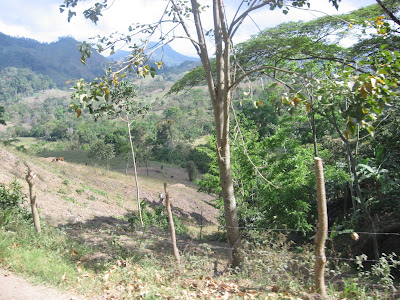

Last week I attended a 4-day Gender Equality workshop run by Cantera, a local Center for Communication and Popular Education. Cantera tries to address gender inequality as an issue for everyone-not just female feminists. After the initial session, men and women broke off into separate groups.
The women’s workshop focused on themes of identity and social conditions. Most of the activities revolved around sharing personal experiences and working in groups. We filled several sheets of flipchart paper with ideas of who we want to be as women. We sat in small groups on the floor and shared our life stories, then used elements of our own stories to make a composite biography of an imaginary woman for each group. As each group read their story in plenary, the same themes kept emerging-abuse, abandonment, limited access to education, single motherhood, poverty.
One exercise that really hit home for me was our reflection on unattained dreams. As a microphone was passed around the room, each woman shared briefly about a dream that she had been unable to pursue. Overwhelmingly, the women expressed their desires to study. Woman after woman told of how she had wanted to go to school, but because her family was poor she had to work in the fields instead, or take care of her siblings, or had become pregnant as a teenager, or had been told that girls don’t need to study because they should be working at home. When the microphone came to me, I passed it on silently, as did the other three foreign volunteers in the room. I have been incredibly blessed with opportunities to follow all my dreams-working overseas, being a “missionary”, going to college, even performing with a professional symphony. I surveyed the room full of women, many of whom are organizers in their communities, and listened to their stories. They had been denied the chance to study-not because they lacked the desire or willingness to work hard, but because of poverty and their social roles as females.
Workshop participants came from all over the country and ranged in ages from teenagers to late 50’s. It seems that most of us work for various NGO’s or community organizations that sponsored them to come so that they could pass on what they learn.
Some of the women I talked with during breaks and lunch in the cafeteria have already been working for years in their communities to teach women about their rights and better social conditions. Victoria, an impressive woman in her 50’s, is a founding member of an all-women-owned cooperative shrimp farm. When she and 35 other women first started working together, the men in their community taunted them, saying they would never turn a profit, that it was man’s work. However, the project turned out to be quite profitable and years later it’s still going strong. Maximina, a 40-something mother and activist from Managua, used to work in a factory under poor conditions, subject to mistreatment by supervisors. “They forced us to work overtime, they didn’t pay us our full salary, and sometimes they even hit the workers.” Then she met a woman from a national feminist movement. She began to learn about her human rights and organize other women in her factory. Instead of firing her, Maximina’s managers saw her leadership potential and made her a supervisor! She eventually quit working in the factory to do workshops with women in her community.
For me, a volunteer working in a different culture, the workshop was incredibly helpful for understanding the disadvantages and dreams common to many women in Nicaragua. And for helping me cope with the frustration I often feel when interacting with men here. And for dreaming of how relationships between men and women here as well as back home would look if/when we achieve true equality.







